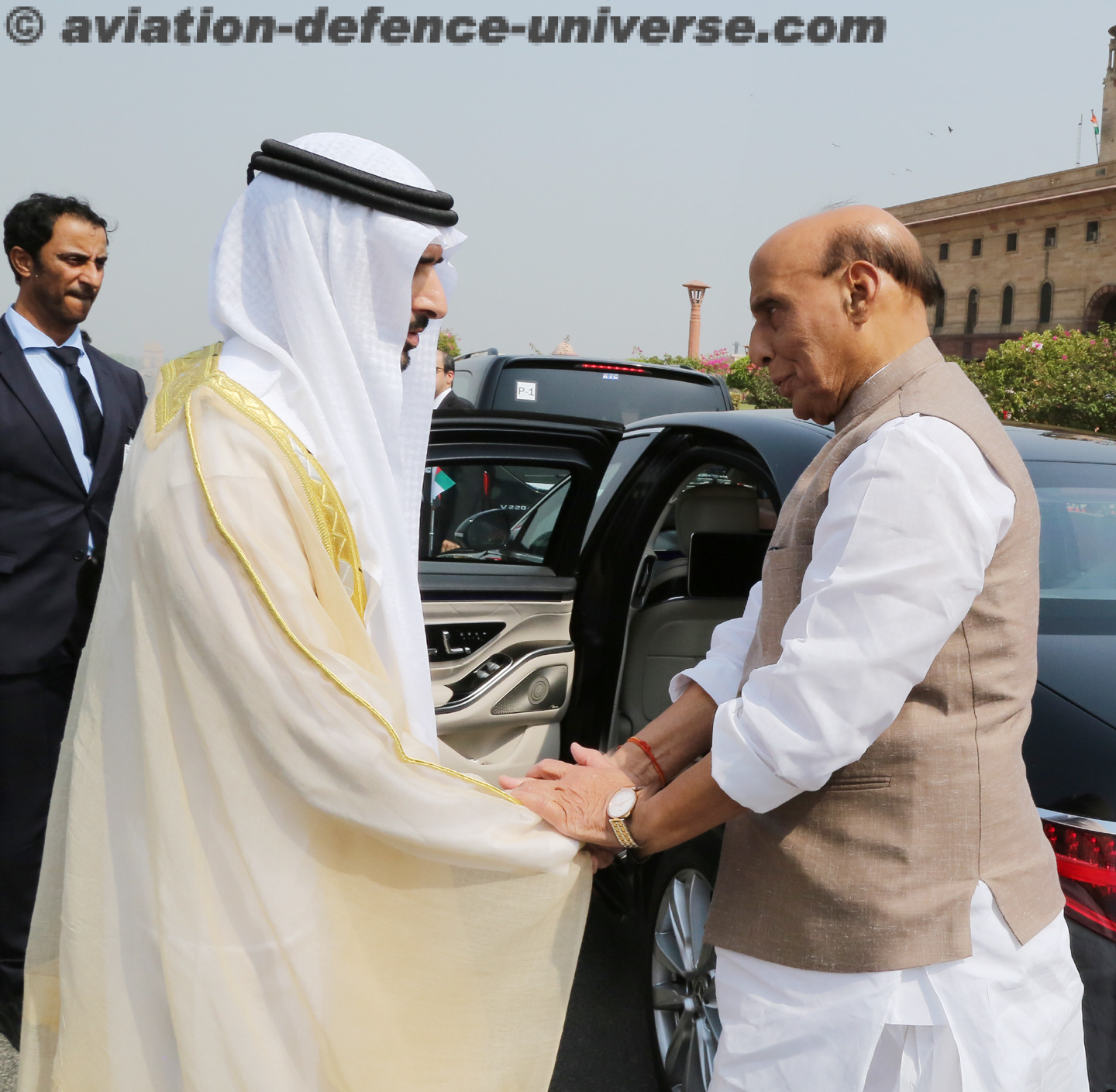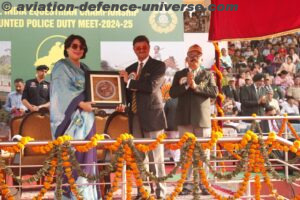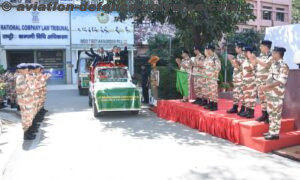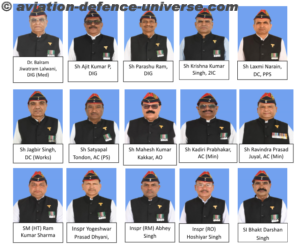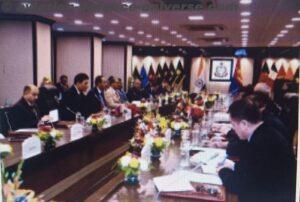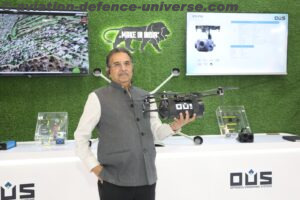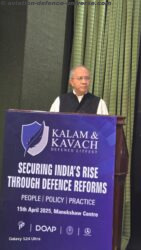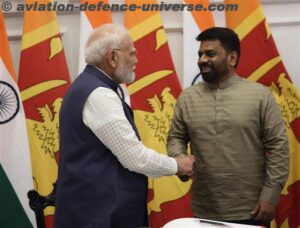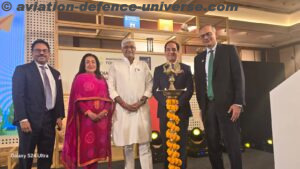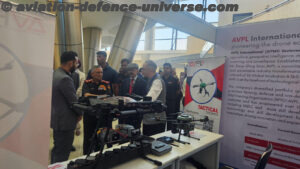- “Zero Tolerance for Terrorism” exhorts MoS Home Nityanand Rai
- A Future-Ready Security Framework: India Showcases Vision at Milipol 2025
By Sangeeta Saxena
New Delhi. 23 April 2025. At the inauguration of the second edition of Milipol India 2025, a defining moment unfolded as India reaffirmed its unwavering commitment to eradicating terrorism—not only within its borders but globally—alongside key international partners like France, Germany, the UAE, and Italy.
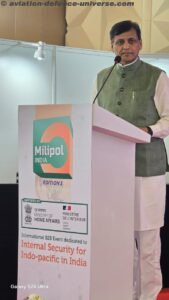 Union Minister of State for Home Affairs, Nityanand Rai, delivered a powerful address, pledging India’s continued and determined role in the global war on terror. “This is the responsibility of India. And we will eradicate terrorism,” he declared, reinforcing Prime Minister Modi’s policy of zero tolerance for terrorism. Rai’s statement came in the wake of condolences offered by French dignitaries for the recent terror attack in Kashmir, highlighting the deep empathy and solidarity between both nations. The conference started with a two minutes silence observed in the memory of the innocent lives snuffed out be militants in Pahalgam, Kashmir yesterday.
Union Minister of State for Home Affairs, Nityanand Rai, delivered a powerful address, pledging India’s continued and determined role in the global war on terror. “This is the responsibility of India. And we will eradicate terrorism,” he declared, reinforcing Prime Minister Modi’s policy of zero tolerance for terrorism. Rai’s statement came in the wake of condolences offered by French dignitaries for the recent terror attack in Kashmir, highlighting the deep empathy and solidarity between both nations. The conference started with a two minutes silence observed in the memory of the innocent lives snuffed out be militants in Pahalgam, Kashmir yesterday.
Milipol India 2025, held in New Delhi, emerged as more than just a homeland security exhibition—it became a symbol of international cooperation against terrorism, rooted in shared values of democracy, respect for international law, and a vision of global peace. Rai welcomed the presence of senior representatives from France, Germany, UAE, and Italy, calling the forum a “stage of deep political and technological synergy.”
Co-hosted by the Ministry of Home Affairs, Government of India and the French Ministry of Interior , Milipol India 2025 served as a powerful reaffirmation of India’s growing partnership with France in the realm of internal security, advanced defence technologies, and joint capacity-building.
Chaired by the Minister of State for Home Affairs, Nityanand Rai, and graced by the French Minister attached to the Ministry of Interior, François-Noël Buffet, the event began with voices of consensus echoing the urgency of cross-border collaboration in tackling evolving global security threats.
India and France have long shared a strategic partnership that transcends defence hardware. Rai reminded the audience of the milestone moment when France became the first European country to accept India’s UPI payments—symbolically launched at the Eiffel Tower. “This shows how our cooperation is expanding into every sphere—digital, economic, and strategic,” he said.
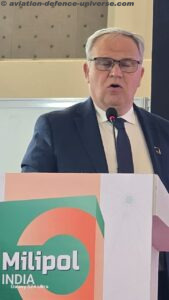 French Minister attached to the Ministry of Interior, François-Noël Buffet reiterated, “this Indo-French relationship is very important at the global level. Our countries share common values—democracy, rule of law, and multilateralism. In a world facing rising uncooperative powers, our strategic cooperation is a much-needed anchor of stability.”
French Minister attached to the Ministry of Interior, François-Noël Buffet reiterated, “this Indo-French relationship is very important at the global level. Our countries share common values—democracy, rule of law, and multilateralism. In a world facing rising uncooperative powers, our strategic cooperation is a much-needed anchor of stability.”
The opening session was attended by dignitaries including H.E. Thierry Mathou, Ambassador of France to India, Hamad Salem Al Ameri, CEO of CARACAL, and Prefect Jounot, President of the International MILIPOL Network.
“In 2023, India also opened a Defence Research and Development Organisation (DRDO) office in its embassy in France to bolster R&D and innovation exchange. This growing partnership is now entering a new era, focused not only on external threats but also on strengthening internal security frameworks—ranging from modern policing to cyber defence and surveillance technologies,” MoS (Home) added.
“The trust and collaboration between India and France is deepening by the day,” said Rai, citing India’s deployment of dog squads at the Paris 2024 Olympics for high-level security missions as an example of mutual trust. He added that bilateral cooperation now spans joint counter-terrorism efforts, intelligence sharing, and a clear roadmap for technological co-development in critical sectors.
 Director General (DG) of the National Security Guard (NSG) Brighu Srinivasan was also on the stage as the Guest of Honour. His force was in good strength at Milipol India 2025 , accessing the equipment and arms on showcase. The National Security Guard (NSG), often referred to as the “Black Cats,” plays a pivotal role in India’s homeland security and special operations. Formed in 1984 as a federal contingency force, the NSG is tasked with counter-terrorism, hostage rescue, and neutralization of threats involving high-risk situations such as hijackings and bomb threats. Operating under the Ministry of Home Affairs, the NSG is equipped with state-of-the-art technology and training to handle complex urban warfare and close-quarters combat. Their swift and precise response during high-stake incidents, such as the 26/11 Mumbai attacks, has cemented their reputation as one of the most elite counter-terrorism units in the world. The NSG continues to be a critical pillar in India’s defence architecture, ensuring rapid response capability and tactical superiority in safeguarding national security.
Director General (DG) of the National Security Guard (NSG) Brighu Srinivasan was also on the stage as the Guest of Honour. His force was in good strength at Milipol India 2025 , accessing the equipment and arms on showcase. The National Security Guard (NSG), often referred to as the “Black Cats,” plays a pivotal role in India’s homeland security and special operations. Formed in 1984 as a federal contingency force, the NSG is tasked with counter-terrorism, hostage rescue, and neutralization of threats involving high-risk situations such as hijackings and bomb threats. Operating under the Ministry of Home Affairs, the NSG is equipped with state-of-the-art technology and training to handle complex urban warfare and close-quarters combat. Their swift and precise response during high-stake incidents, such as the 26/11 Mumbai attacks, has cemented their reputation as one of the most elite counter-terrorism units in the world. The NSG continues to be a critical pillar in India’s defence architecture, ensuring rapid response capability and tactical superiority in safeguarding national security.
At the heart of Milipol India 2025 were urgent discussions around cybercrime, terrorism, human trafficking, irregular migration, civil defence, and the responsible use of artificial intelligence. The event also spotlighted a cutting-edge exhibition, showcasing over 70 participants from France, India, the Netherlands, Japan, Abu Dhabi, and the UK.
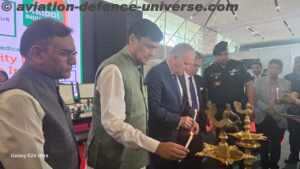 “The Indo-French partnership also extends to the domain of homeland security. We are committed to a free, open, inclusive, peaceful Indo-Pacific region, a region where we can see the growth of a lot of transnational compliance that our countries are working to dismantle. It is in this spirit that the excellent cooperation between France and India in terms of internal security is inscribed. It is developed in particular in the field of the fight against terrorism, organised crime in all its forms, cybercrime, trafficking of suspects, trafficking of human beings, irregular migration and cooperation in terms of civil security. Our trustworthy partnership is based on judicial and institutional agreements, as well as on official dialogues,” the French Minister elaborated.
“The Indo-French partnership also extends to the domain of homeland security. We are committed to a free, open, inclusive, peaceful Indo-Pacific region, a region where we can see the growth of a lot of transnational compliance that our countries are working to dismantle. It is in this spirit that the excellent cooperation between France and India in terms of internal security is inscribed. It is developed in particular in the field of the fight against terrorism, organised crime in all its forms, cybercrime, trafficking of suspects, trafficking of human beings, irregular migration and cooperation in terms of civil security. Our trustworthy partnership is based on judicial and institutional agreements, as well as on official dialogues,” the French Minister elaborated.
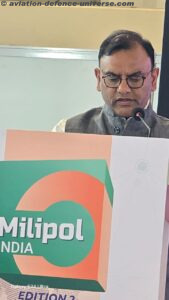 “India today is building a future-ready security framework, one that embraces technology, collaboration and local innovation,” said Sanjeev Kumar Jindal, Additional Secretary, Ministry of Home Affairs. “Millipol India offers us a critical platform to strengthen synergies between industry, policymakers, and enforcement agencies.”
“India today is building a future-ready security framework, one that embraces technology, collaboration and local innovation,” said Sanjeev Kumar Jindal, Additional Secretary, Ministry of Home Affairs. “Millipol India offers us a critical platform to strengthen synergies between industry, policymakers, and enforcement agencies.”
The growing focus on advanced technology in policing and disaster management was reflected in the display of UAVs, facial recognition tools, satellite surveillance, and CBRN (Chemical, Biological, Radiological, and Nuclear) response solutions.
“Equipping our forces with state-of-the-art technology is not a one-time task—it’s a continuous and evolving process,” emphasised Jindal. “The Ministry of Home Affairs remains committed to modernising both central and state security forces.”
Buffet, meanwhile, reflected on the long-standing legacy of Indo-French cooperation, citing the 27th anniversary of the strategic partnership forged in 1998. “We have found in India a trusted, responsive, and reliable partner, particularly through the CBI and MHA. Operational collaboration with the National Security Guard and French Gendarmerie has been exemplary, ” he said.
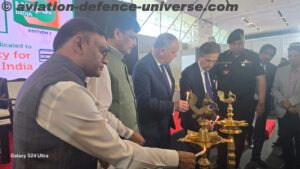 Crucially, Milipol 2025 was not only a display of defence technologies but a springboard for future cooperation. Joint ventures under the ‘Make in India’ umbrella, production-linked incentives, and ease of doing business were highlighted as key factors for enhancing French investments in India’s internal security domain.
Crucially, Milipol 2025 was not only a display of defence technologies but a springboard for future cooperation. Joint ventures under the ‘Make in India’ umbrella, production-linked incentives, and ease of doing business were highlighted as key factors for enhancing French investments in India’s internal security domain.
“In recent years, thanks to our joint fight against terrorism, information sharing, and high-level defence partnerships, India and France have shown strong co-operation. Our security partnership is continuously strengthening. This is a sign of our deep co-operation, and a sign of our common commitment to international security. France is the fifth largest trading partner of India. France considers India as an important market for its products, and is considering increasing the number of joint industries and promoting investment in India,” Rai reinforced.
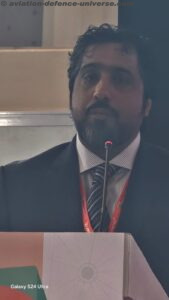 The inaugural session of Milipol India witnessed key addresses from prominent organisers and industry leaders. Dr. Nasir Jamal, Director at PHDCCI, delivered the Inaugural Address as the Co-Organiser of the event, setting the tone for a collaborative and impactful gathering. Rajan Sharma, President and Director of Inter Ads Exhibitions Pvt. Ltd., extended a warm welcome to the dignitaries and delegates, reinforcing the shared vision of the show’s co-organisers. Bringing a global industry perspective to the forum, Hamad Salem Al Ameri, Chief Executive Officer of CARACAL, addressed the gathering with insights into international defence trends. The session concluded with a Vote of Thanks and Concluding Remarks by Vaibhav Gupta from MKU, who also serves as Co-Chair of the PHDCCI Defence & Homeland Security Committee, acknowledging the collective effort that brought Milipol India to fruition.
The inaugural session of Milipol India witnessed key addresses from prominent organisers and industry leaders. Dr. Nasir Jamal, Director at PHDCCI, delivered the Inaugural Address as the Co-Organiser of the event, setting the tone for a collaborative and impactful gathering. Rajan Sharma, President and Director of Inter Ads Exhibitions Pvt. Ltd., extended a warm welcome to the dignitaries and delegates, reinforcing the shared vision of the show’s co-organisers. Bringing a global industry perspective to the forum, Hamad Salem Al Ameri, Chief Executive Officer of CARACAL, addressed the gathering with insights into international defence trends. The session concluded with a Vote of Thanks and Concluding Remarks by Vaibhav Gupta from MKU, who also serves as Co-Chair of the PHDCCI Defence & Homeland Security Committee, acknowledging the collective effort that brought Milipol India to fruition.
The second edition of Milipol India took off with a resounding message: global security today demands collective response and strategic vision. As Buffet vociferously put it, “Long live Milipol India—and long live the enduring friendship between India and France.” The event reinforced not just bilateral cooperation but a shared global commitment to innovation-driven, secure, and resilient societies.
















